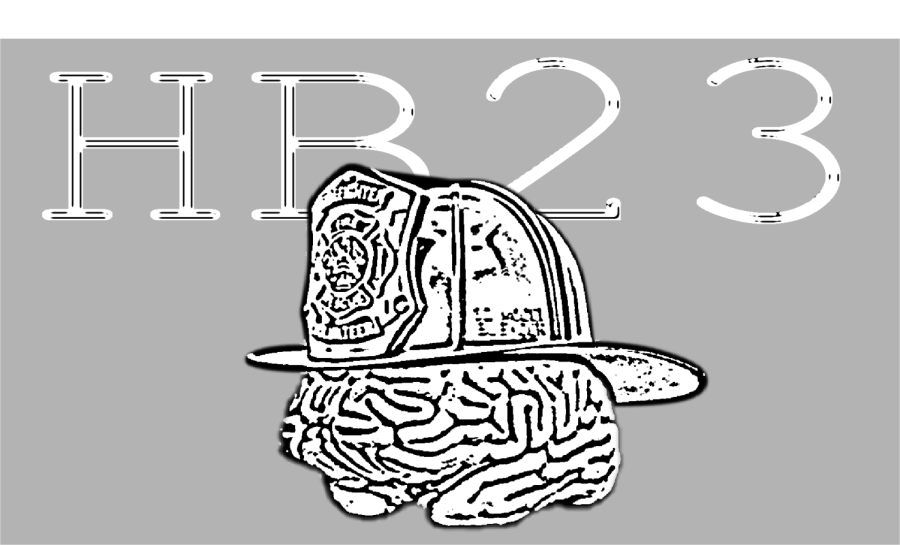Hibben: Protecting First Responders Starts with Their Mental Health
(Graphic by Claire Peterson | The Daily Utah Chronicle)
February 4, 2022
First responders are overworked and at-risk during this pandemic. Their work is incredibly demanding and they are at high risk for developing certain mental disorders. And as the pandemic rages on with the rapid spread of the Omicron variant, continual pressure is put on first responders.
These individuals include police officers, paramedics, firefighters, emergency medical technicians, correctional officers, dispatchers and search and rescue workers. In hopes to provide some relief, Rep. Ryan Wilcox and Sen. Don Ipson are sponsoring H.B. 23 to provide mental health services for first responders and their families.
The bill creates a $5 million grant program, requiring first responder agencies to provide mental health resources for both current and retired employees and their families. These agencies are a “local district, municipality, interlocal entity, or other political subdivision that employs a first responder to provide fire protection, paramedic, law enforcement or emergency services.” They would be given access to and care by mental health therapists and peer support groups.
The pandemic has taught us all how important mental health is to our overall well-being. First responders are essential to our emergency needs, and yet we continue to forget the stress and trauma they endure every day. The Utah State Legislature should pass H.B. 23 to help these workers combat mental health issues caused by their strenuous work conditions.
First Responders’ Declining Mental Health
Paramedics and emergency medical technicians work on the frontlines of all medical care. Their work can be incredibly traumatic and stressful, as their quick actions in medical situations affect the patient’s health. In addition to these stressors, the pandemic has put these workers at risk for contracting the coronavirus and complicated their work schedules to the point of over-exertion.
In 2020, health care workers were surveyed and 86% reported anxiety; 82% experienced emotional exhaustion. This stress not only affects these essential workers and their families but also the quality of care.
Police officers and firefighters are also facing similar risks. Both face incredibly trying work environments and have to quickly move on from events that take a mental toll. They are at high risk for PTSD, anxiety, depression and suicidal ideations. Like health care workers, there is a severe lack of attention to the importance of mental health in the field. Many of these workers don’t seek help or simply can’t find the time.
The barriers in these fields to accessing mental health care can be alleviated by mandating these services for employees. No longer will employees have to look for mental health care, or determine themselves if they need help. They will receive not only assessments after potentially traumatic events but regular access to mental health professionals.
Requiring these agencies to provide care will make mental health coverage another part of the workplace. Normalizing the need for mental health care in these stressful, risky work environments by demanding these agencies to act is the advancement Utah needs.
The Families
Stress and long hours caused by these professions also affects the families of first responders. Along with the constant stress of possibly spreading COVID-19 to loved ones, the ongoing mental strain caused by untreated mental issues can affect relationships.
Long periods of separation from children and partners can be difficult. In a study done by the Washington Post, 42% of frontline health workers said their relationships with family were negatively affected, and eight out of every ten workers worried about transmitting the virus to their loved ones. Even before the pandemic, 59% of firefighters in one study reported difficulties with family because of their profession.
Access to mental health services is already incredibly difficult to find in the United States. These families need to be able to access care so their lives are less affected by these stressful professions.
Conditions of H.B. 23
The proposed bill creates a one-time appropriation of $5 million to the Department of Human Services. Any agency that employs first responders must provide mental health resources. These include a mental health assessment and a mental health therapist designated to current and retired first responders and their families. This therapist will determine if outpatient treatment or peer support is appropriate for the patient.
Any access by these patients to mental health services would be confidential, and the grants to first responder agencies would require the mental health providers have “experience in working with first responders.” They would provide “regular periodic screenings” of employees and “assessments or debriefings for personnel involved in a critical incident within 12 hours.” These agencies must apply for a grant, with a detailed plan on how to provide these resources. The proposed grant would begin July 1, 2022, to June 30, 2023.
First responders keep our society moving and working, even more so during a global pandemic. Their mental health is crucial to their work. We must prioritize care for essential workers, and H.B. 23 is a step in the right direction to providing mental health services for all.









